#learnwithshopify
Explore tagged Tumblr posts
Text
Elevate Your E-Commerce: Insights from an SEO Consultant
In the ever-evolving world of e-commerce, standing out from the crowd is essential for success. With millions of online stores vying for attention, how can you ensure that your e-commerce website gets noticed?
The answer lies in effective Search Engine Optimization (SEO). In this article, we'll explore valuable insights from an SEO consultant to help you elevate your e-commerce business and drive more traffic to your website.

Understanding SEO
Before diving into specific insights, let's first understand what SEO is all about. SEO stands for Search Engine Optimization, and it's the practice of optimizing your website to rank higher in search engine results pages (SERPs).
When your website ranks higher, it becomes more visible to potential customers searching for products or services related to your business.
Importance of SEO for E-Commerce
In the competitive landscape of e-commerce, SEO plays a crucial role in driving organic traffic to your website. Studies show that the majority of online purchases begin with a search engine query.
By implementing SEO best practices, you can increase your website's visibility, attract more visitors, and ultimately, boost your sales.
Insights from an SEO Consultant
Here are some valuable insights from an experienced ecommerce SEO consultant to help you optimize your e-commerce website
Keyword Research
Identify relevant keywords and phrases that potential customers are likely to use when searching for products or services similar to yours. Incorporate these keywords naturally into your website's content, including product descriptions, meta tags, and headings.
Optimized Product Pages
Each product page on your e-commerce website should be optimized for search engines. Use descriptive product titles and include keywords in your product descriptions. High-quality images and user-friendly navigation are also essential for a positive user experience.
Source: YouTube: (learnwithshopify)
Mobile Optimization
With the increasing use of smartphones for online shopping, it's crucial to ensure that your e-commerce website is mobile-friendly. Mobile optimization not only improves the user experience but also contributes to higher search engine rankings.
Content Marketing
Create high-quality, engaging content related to your products or industry. This could include blog posts, how-to guides, or video tutorials. Content marketing not only attracts organic traffic but also establishes your brand as an authority in your niche.
Link Building
Build a strong backlink profile by earning links from reputable websites in your industry. Quality backlinks signal to search engines that your website is trustworthy and authoritative, leading to higher rankings in SERPs.
Conclusion
In today's competitive e-commerce landscape, effective SEO strategies are essential for success. By implementing the insights provided by an experienced SEO consultant, you can elevate your e-commerce business, drive more traffic to your website, and increase your sales.
Remember to prioritize keyword research, optimize your product pages, focus on mobile optimization, invest in content marketing, and build a strong backlink profile. With the right SEO strategy in place, your e-commerce website can reach new heights and achieve long-term success.
0 notes
Text
How to use AI for Lead Generation?

Here's a detailed guide on how to use AI for lead generation: - Understand Your Target Audience: - Use AI to analyze existing customer data and identify patterns. This information can help you create detailed buyer personas, allowing you to tailor your lead-generation efforts to the specific needs and preferences of your audience. - Implement Predictive Analytics: - Leverage predictive analytics models to identify potential leads based on historical data. Predictive models can analyze various factors to predict which leads are more likely to convert, allowing you to prioritize your efforts. - Lead Scoring with AI: - Develop a lead scoring system using AI algorithms. These algorithms can assign scores to leads based on their behavior, engagement with your content, and other relevant factors. Focus on leads with higher scores for more targeted outreach. - Chatbots for Initial Engagement: - Integrate chatbots with AI capabilities on your website or messaging platforms. Chatbots can engage with visitors, answer frequently asked questions, and collect basic information to qualify leads before passing them on to sales teams. - Natural Language Processing (NLP): - Implement NLP to analyze and understand customer interactions. NLP can help you gather insights from customer reviews, social media conversations, and other unstructured data to refine your lead generation strategy. - Content Personalization: - Use AI to personalize your content based on user behavior and preferences. Tailored content is more likely to capture the attention of potential leads and keep them engaged. https://www.youtube.com/watch?v=YiW9t8TI8wA&ab_channel=JordanPlatten - Behavioral Analysis: - Employ AI algorithms to analyze user behavior on your website and other online platforms. Identify patterns that indicate strong interest or intent to purchase, allowing you to target those leads more effectively. - Social Media Monitoring: - Utilize AI-powered tools to monitor social media channels for mentions of your brand, relevant keywords, or industry trends. Engage with users and identify potential leads based on social media interactions. - Automated Email Campaigns: - Implement AI-driven email marketing tools to automate and personalize email campaigns. Use machine learning algorithms to optimize the timing, content, and frequency of emails for each lead. - Lookalike Audience Targeting: - Use AI to identify lookalike audiences based on the characteristics of your existing high-value leads or customers. This helps expand your reach to individuals who share similar traits and are likely to be interested in your offerings. - Lead Segmentation and Clustering: - Apply clustering algorithms to segment leads into groups based on similarities. This allows you to tailor your marketing messages to specific segments and improve the relevance of your communication. - AI-Powered Ad Targeting: - Leverage AI for targeted advertising. Use algorithms to analyze user behavior and preferences, allowing you to create more effective ad campaigns that resonate with potential leads. https://www.youtube.com/watch?v=BYpJQ0pYBVE&t=83s&ab_channel=LearnWithShopify - CRM Integration: - Integrate AI capabilities into your Customer Relationship Management (CRM) system. AI-enhanced CRMs can provide deeper insights into lead interactions, automate routine tasks, and improve overall lead management. - Continuous Optimization: - Monitor the performance of your AI-driven lead generation strategies and continuously optimize based on results. Use feedback loops to improve the accuracy of predictive models and refine your targeting. - Evaluate and Refine: - Regularly assess the performance of your AI-powered lead generation efforts. Analyze conversion rates, customer acquisition costs, and other key metrics to refine your strategies and ensure ongoing success. How To Use AI for Lead Generation: Practical Examples, Code Snippets, and Actionable Insights In the digital age, Artificial Intelligence (AI) has become an indispensable tool for businesses seeking to optimize their lead-generation processes. AI's ability to analyze vast amounts of data, identify patterns, and predict customer behavior is revolutionizing how companies approach potential clients. Section 1: Understanding AI in Lead Generation - Basics of AI in Lead Generation: Overview of how AI can identify potential leads, score them, and predict buying behavior. - Importance for Businesses: Discuss the role of AI in streamlining lead generation, enhancing accuracy, and increasing efficiency. Section 2: AI-Driven Customer Profiling - Creating Detailed Customer Profiles: - AI algorithms analyze customer data to create comprehensive profiles. - Practical Example: Using AI to segment customers based on buying patterns. - Code Snippet: Python code for clustering customer data. from sklearn.cluster import KMeans kmeans = KMeans(n_clusters=5) customer_segments = kmeans.fit_predict(customer_data) Section 3: Predictive Analytics for Identifying Leads - Leveraging Predictive Models: - Using AI to analyze market trends and customer data to predict potential leads. - Practical Example: E-commerce site using predictive analytics to identify potential customers for a new product line. - Code Snippet: Building a predictive model. from sklearn.ensemble import RandomForestClassifier model = RandomForestClassifier() model.fit(training_data, labels) predictions = model.predict(new_customer_data) Section 4: AI in Digital Marketing for Lead Generation - Personalized Marketing Campaigns: - AI's role in creating tailored marketing content based on customer preferences and behaviors. - Practical Example: An AI system that personalizes email marketing campaigns. - Code Snippet: Customizing email content. if customer_profile == 'technology': send_email(technology_offer_template, customer_profile) Section 5: Chatbots and Conversational AI for Engagement - Using AI Chatbots for Initial Engagement: - Deploying AI chatbots on websites and social media to engage visitors and capture leads. - Practical Example: A real estate company using a chatbot to qualify leads on its website. - Code Snippet: Basic chatbot interaction setup. from transformers import pipeline chatbot = pipeline('conversational') response = chatbot("Can you tell me more about your budget for a home?") Section 6: Enhancing Lead Scoring with AI - AI for Effective Lead Scoring: - How AI models can score leads based on the likelihood of conversion. - Practical Example: An insurance company using AI to prioritize leads. - Code Snippet: Scoring leads based on predictive models. lead_score = model.predict_proba(lead_data) Section 7: AI in Social Media for Lead Generation - Analyzing Social Media Data: - Utilizing AI to analyze social media trends and interactions for potential leads. - Practical Example: A fashion brand using AI to identify potential influencers and customers on social media. - Code Snippet: Analyzing social media comments. from textblob import TextBlob for comment in social_media_comments: sentiment = TextBlob(comment).sentiment.polarity if sentiment > 0.5: potential_lead_list.append(comment.author) Section 8: Overcoming Challenges and Limitations - Addressing Data Privacy and Ethical Concerns: - Ethical considerations and data privacy laws in the context of AI-driven lead generation. - Mitigating Bias in AI Models: - Ensuring fairness and accuracy in AI lead generation processes. Section 9: Future Trends in AI for Lead Generation - Emerging Technologies and Approaches: - Discussion on upcoming trends like AI in voice search optimization and AI-powered lead generation in virtual reality platforms. Conclusion - Maximizing AI's Potential in Lead Generation: - Summing up the importance of AI in enhancing lead generation strategies. - Actionable Insights: - Recommendations on implementing AI in lead generation, continuous learning, and adapting to technological advancements. Final ThoughtsLeveraging AI for lead generation can profoundly impact a business's ability to attract and convert potential customers. By understanding and effectively implementing AI tools By incorporating AI into your lead generation process, you can automate repetitive tasks, enhance personalization, and identify high-value leads more efficiently. As technology continues to evolve, staying informed about the latest AI advancements will help you maintain a competitive edge in lead generation. Read the full article
0 notes
Text
ClickAgencyA.I. Professional information Review ✅ Last Version

ClickAgencyA.I. Professional information Review ✅ Last Version
It is stated that 61% of Marketers Say Generating Traffic and Leads is Their Top Challenge. There are thousands of products promising the world but at the end of the day business owners only care about leads and results.
Reports show the lead gen industry is worth $135 billion in the U.S. alone, and being able to drive leads consistently is the strongest marketing asset you can have today. Simply looking at the stats mentioned, you can obviously see that currently, the easiest way to build a legitimate business from scratch is starting your own lead generation agency.
Many agencies are making over $50,000 per month creating lead pages, and ads, and generating targeted leads. The possibilities in this industry are endless as there are tons of potential clients needing lead page creation, ad creation, and lead generation right now on freelancing sites like Freelancer.com or Upwork.com.
However, starting up your own lead gen agency conventionally is no easy job as it requires tons of time and money invested. If you are just a newbie, this seems to be impossible!
Wait! Don't lose hope yet! What if you had a done-for-you system to deliver fresh, targeted leads for yourself or local biz owners minutes from now? You have just found your ultimate solution — ClickAgencyAl.
What Is ClickAgencyAI?
ClickAgencyAl is a comprehensive platform powered by AI that enables businesses to create lead campaigns effortlessly and effectively. Its remarkable features include A.I. agency lead campaigns, automatic generation and submission of image and video ads, creation of compelling copy and visually appealing graphics, and high-converting video ads.
With ready-to-use templates, user-friendly drag-and-drop editing, and auto-generated lead magnets, ClickAgencyAl simplifies the entire process, saving you valuable time and effort.
Additionally, the platform offers agency rights, allowing you to easily sell complete campaigns or individual marketing materials. In this review, we will delve into ClickAgencyAlts features and benefits, providing you with the necessary insights to detente whether this is the ideal marketing solution for your business.
About The Creators- Ben Murray & Abhi Dwivedi :

Ben Murray has long been regarded as a both successful affiliate marketer and software creator with tons of profitable products. Specifically, in previous launches, he is a Top 5 Affiliate on JVZoo winning over 40 Product of the day Awards. His long aim is to help people handle problems with SEO work, traffic generation, and setting up websites,...
Some of his remarkable launches are MasicPress Agency, Vidnzonial, VidReputposer Commercial, PlayPix Commercial, VidRepurposer Diamond, Spy Stream Pro, AgencyReel, etc.
Randomly search one of those names on the Internet and you will find it with loads of good reviews, high evaluations from experts, and the trust of the users would you believe that thousands sold out
This time, Ben Murray teams up with Abhi Dwivedi to a brand new product — ClickAgencyAl which I'm sure is no exception and it's going to do wonders for you!
For More Details
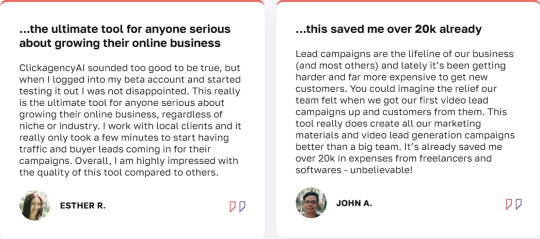
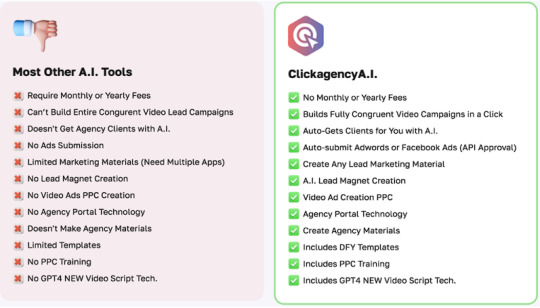
Pros
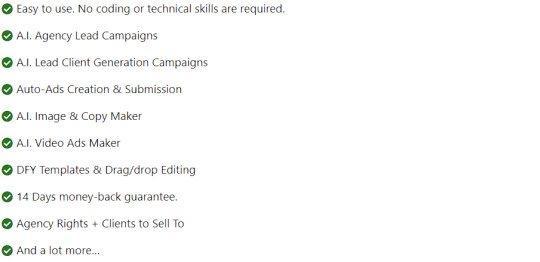
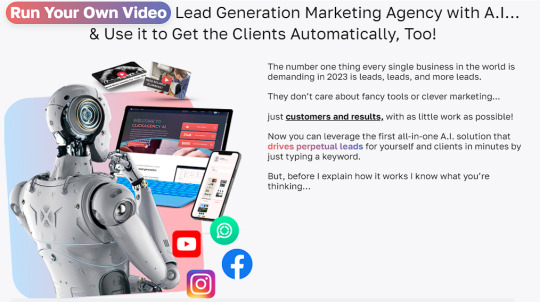


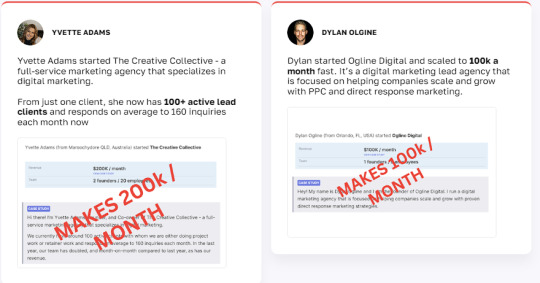


For More Details Click Here
#Make Money From Your Home With ClickAgencyA.I. Professional ✅#With New & Lastest Version#Many People are now using this Ai And They Are Making $22000 Per Week#.#shopify#shopifydropshipping#shopifytutorial#shopifystore#shopifytutorialforbeginners#howtostartshopify#learnwithshopify#shopify2023#makemoneyonline#howtomakemoneyonline#howtomakemoneyonline2023#earnmoneyonline#makemoneyonline2023#howtoearnmoneyonline#makemoney#howtomakemoney#money#clickagencyaibonuses#clickagencyaiotos#clickagencyaiwalkthrough#honestclickagencyaireview#clickagencyaiupgrades#clickagency#clickagencyai#clickagencyoto#getclickagency
0 notes
Text
How to use AI for Lead Generation?

Here's a detailed guide on how to use AI for lead generation: - Understand Your Target Audience: - Use AI to analyze existing customer data and identify patterns. This information can help you create detailed buyer personas, allowing you to tailor your lead-generation efforts to the specific needs and preferences of your audience. - Implement Predictive Analytics: - Leverage predictive analytics models to identify potential leads based on historical data. Predictive models can analyze various factors to predict which leads are more likely to convert, allowing you to prioritize your efforts. - Lead Scoring with AI: - Develop a lead scoring system using AI algorithms. These algorithms can assign scores to leads based on their behavior, engagement with your content, and other relevant factors. Focus on leads with higher scores for more targeted outreach. - Chatbots for Initial Engagement: - Integrate chatbots with AI capabilities on your website or messaging platforms. Chatbots can engage with visitors, answer frequently asked questions, and collect basic information to qualify leads before passing them on to sales teams. - Natural Language Processing (NLP): - Implement NLP to analyze and understand customer interactions. NLP can help you gather insights from customer reviews, social media conversations, and other unstructured data to refine your lead generation strategy. - Content Personalization: - Use AI to personalize your content based on user behavior and preferences. Tailored content is more likely to capture the attention of potential leads and keep them engaged. https://www.youtube.com/watch?v=YiW9t8TI8wA&ab_channel=JordanPlatten - Behavioral Analysis: - Employ AI algorithms to analyze user behavior on your website and other online platforms. Identify patterns that indicate strong interest or intent to purchase, allowing you to target those leads more effectively. - Social Media Monitoring: - Utilize AI-powered tools to monitor social media channels for mentions of your brand, relevant keywords, or industry trends. Engage with users and identify potential leads based on social media interactions. - Automated Email Campaigns: - Implement AI-driven email marketing tools to automate and personalize email campaigns. Use machine learning algorithms to optimize the timing, content, and frequency of emails for each lead. - Lookalike Audience Targeting: - Use AI to identify lookalike audiences based on the characteristics of your existing high-value leads or customers. This helps expand your reach to individuals who share similar traits and are likely to be interested in your offerings. - Lead Segmentation and Clustering: - Apply clustering algorithms to segment leads into groups based on similarities. This allows you to tailor your marketing messages to specific segments and improve the relevance of your communication. - AI-Powered Ad Targeting: - Leverage AI for targeted advertising. Use algorithms to analyze user behavior and preferences, allowing you to create more effective ad campaigns that resonate with potential leads. https://www.youtube.com/watch?v=BYpJQ0pYBVE&t=83s&ab_channel=LearnWithShopify - CRM Integration: - Integrate AI capabilities into your Customer Relationship Management (CRM) system. AI-enhanced CRMs can provide deeper insights into lead interactions, automate routine tasks, and improve overall lead management. - Continuous Optimization: - Monitor the performance of your AI-driven lead generation strategies and continuously optimize based on results. Use feedback loops to improve the accuracy of predictive models and refine your targeting. - Evaluate and Refine: - Regularly assess the performance of your AI-powered lead generation efforts. Analyze conversion rates, customer acquisition costs, and other key metrics to refine your strategies and ensure ongoing success. How To Use AI for Lead Generation: Practical Examples, Code Snippets, and Actionable Insights In the digital age, Artificial Intelligence (AI) has become an indispensable tool for businesses seeking to optimize their lead-generation processes. AI's ability to analyze vast amounts of data, identify patterns, and predict customer behavior is revolutionizing how companies approach potential clients. Section 1: Understanding AI in Lead Generation - Basics of AI in Lead Generation: Overview of how AI can identify potential leads, score them, and predict buying behavior. - Importance for Businesses: Discuss the role of AI in streamlining lead generation, enhancing accuracy, and increasing efficiency. Section 2: AI-Driven Customer Profiling - Creating Detailed Customer Profiles: - AI algorithms analyze customer data to create comprehensive profiles. - Practical Example: Using AI to segment customers based on buying patterns. - Code Snippet: Python code for clustering customer data. from sklearn.cluster import KMeans kmeans = KMeans(n_clusters=5) customer_segments = kmeans.fit_predict(customer_data) Section 3: Predictive Analytics for Identifying Leads - Leveraging Predictive Models: - Using AI to analyze market trends and customer data to predict potential leads. - Practical Example: E-commerce site using predictive analytics to identify potential customers for a new product line. - Code Snippet: Building a predictive model. from sklearn.ensemble import RandomForestClassifier model = RandomForestClassifier() model.fit(training_data, labels) predictions = model.predict(new_customer_data) Section 4: AI in Digital Marketing for Lead Generation - Personalized Marketing Campaigns: - AI's role in creating tailored marketing content based on customer preferences and behaviors. - Practical Example: An AI system that personalizes email marketing campaigns. - Code Snippet: Customizing email content. if customer_profile == 'technology': send_email(technology_offer_template, customer_profile) Section 5: Chatbots and Conversational AI for Engagement - Using AI Chatbots for Initial Engagement: - Deploying AI chatbots on websites and social media to engage visitors and capture leads. - Practical Example: A real estate company using a chatbot to qualify leads on its website. - Code Snippet: Basic chatbot interaction setup. from transformers import pipeline chatbot = pipeline('conversational') response = chatbot("Can you tell me more about your budget for a home?") Section 6: Enhancing Lead Scoring with AI - AI for Effective Lead Scoring: - How AI models can score leads based on the likelihood of conversion. - Practical Example: An insurance company using AI to prioritize leads. - Code Snippet: Scoring leads based on predictive models. lead_score = model.predict_proba(lead_data) Section 7: AI in Social Media for Lead Generation - Analyzing Social Media Data: - Utilizing AI to analyze social media trends and interactions for potential leads. - Practical Example: A fashion brand using AI to identify potential influencers and customers on social media. - Code Snippet: Analyzing social media comments. from textblob import TextBlob for comment in social_media_comments: sentiment = TextBlob(comment).sentiment.polarity if sentiment > 0.5: potential_lead_list.append(comment.author) Section 8: Overcoming Challenges and Limitations - Addressing Data Privacy and Ethical Concerns: - Ethical considerations and data privacy laws in the context of AI-driven lead generation. - Mitigating Bias in AI Models: - Ensuring fairness and accuracy in AI lead generation processes. Section 9: Future Trends in AI for Lead Generation - Emerging Technologies and Approaches: - Discussion on upcoming trends like AI in voice search optimization and AI-powered lead generation in virtual reality platforms. Conclusion - Maximizing AI's Potential in Lead Generation: - Summing up the importance of AI in enhancing lead generation strategies. - Actionable Insights: - Recommendations on implementing AI in lead generation, continuous learning, and adapting to technological advancements. Final ThoughtsLeveraging AI for lead generation can profoundly impact a business's ability to attract and convert potential customers. By understanding and effectively implementing AI tools By incorporating AI into your lead generation process, you can automate repetitive tasks, enhance personalization, and identify high-value leads more efficiently. As technology continues to evolve, staying informed about the latest AI advancements will help you maintain a competitive edge in lead generation. Read the full article
0 notes